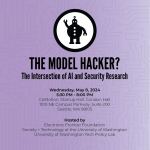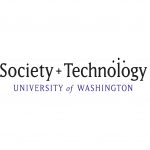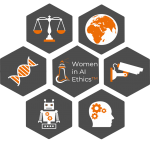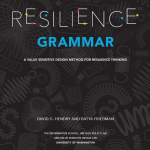July 31, 2024
TPL paper wins student award at PETS

A Tech Policy Lab paper was awarded in the Runner Up category at the 2024 Proceedings on Privacy Enhancing Technologies Symposium. “Over Fences and Into Yards: Privacy Threats and Concerns of Commercial Satellites,” was written by Rachel McAmis, Mia Bennett and Tadayoshi Kohno, along with Mattea Sim of University of Indiana Bloomington. The paper captures […]
MoreJune 23, 2024
TPL alumna’s star is on the rise
UW School of Law

Maria P. Angel, Tech Policy Lab alumna and 2024 Ph.D. graduate from the School of Law, is already making waves in the field even as her career is just getting started. A recent profile by the School of Law highlights Angel’s path from working in research and advocacy in Colombia to postdoctoral studies with Yale […]
MoreJune 13, 2024
“Is tricking a robot hacking?“
Transcript and audio recording of our panel conversation about AI, computer hacking, and security research

On May 8, 2024, the UW Tech Policy Lab, Society + Technology at UW, and the Electronic Frontier Foundation jointly convened The Model Hacker? The Intersection of AI and Security Research. This event brought into conversation Cindy Cohn, Ryan Calo, Tadayoshi Kohno, Franziska Roesner, and Jacob Hoffman-Andrews, experts in computer science, law, and security […]
MoreMay 3, 2024
University of Washington launches Society + Technology with focus on AI and emerging technologies

Society + Technology at the University of Washington is a new program that uplifts an emergent network of faculty, students, researchers, staff, and programs across all of the UW’s three campuses (Bothell, Seattle, and Tacoma) and the School of Medicine around the social, societal, and justice aspects of technology. The program’s focus this spring is […]
MoreFebruary 13, 2024
Welcome Aylin Caliskan as new TPL co-director

The co-directors of UW’s Tech Policy Lab are familiar with breaking ground and testing new ideas together. Since 2013, they have partnered in research and education to guide conversations around topics with no clear path to an answer or oftentimes even a precedent. This prepared them well for the task of replacing one of their […]
MoreFebruary 1, 2024
TPL welcomes Monika Sengul-Jones

The UW Tech Policy Lab is pleased to welcome Monika Sengul-Jones, PhD (she/her, they/them), as the Program Manager for a new initiative to foster cross-campus collaboration at the intersection of society and technology. Innovations in emerging technologies, from generative AI to quantum computing, continue to garner public attention about their impacts on society. The new […]
MoreJanuary 22, 2024
TPL scholar awarded Siegel fellowship

The University of Washington Tech Policy Lab is pleased to announce postdoctoral scholar Nick Logler as its Siegel Research Fellow. The fellowship of $125,000 was awarded by Siegel Family Endowment. Logler earned his PhD from the UW Information School in 2023, with research focused on how people are affected by experiences of designing, building, and […]
MoreDecember 5, 2023
TPL assistant and alumnus named Rising Stars in AI
Women in AI Ethics

Women in AI Ethics recently named two TPL associates to their 2024 list of Rising Stars in AI Ethics. TPL research assistant and PhD candidate Maria P. Angel, and Meg Young, PhD, a TPL alumnus, were recognized in a group of just eight for their work in this critical space. Women in AI Ethics is […]
MoreNovember 3, 2023
TPL Co-Director named Associate Dean for Faculty Success
College of Engineering

The College of Engineering recently announced that TPL Co-Director Tadayoshi Kohno will become the Associate Dean for Faculty Success in the College of Engineering, effective Jan. 1, 2024, subject to approval of the Provost. Faculty are foundational to the success of students, so supporting them in their roles “increases our collective impact.” This role will support, […]
MoreApril 5, 2023
Tech Policy Lab Releases Resilience Grammar: A Value Sensitive Design Method for Resilience Thinking
UW Tech Policy Lab

SEATTLE – Supply chain and agricultural issues have been central to policy discussions and media interest in the past year, and experts are coming together to explore problems and generate solutions. As researchers, designers and policymakers work to understand these systems’ capacity for resiliency, the need for a structured analysis and design approach is increasingly […]
More